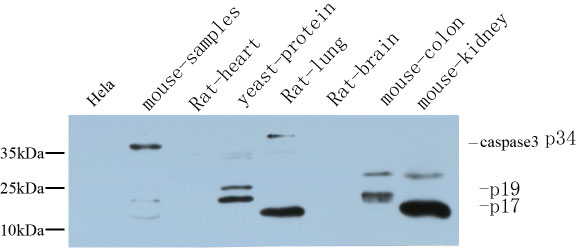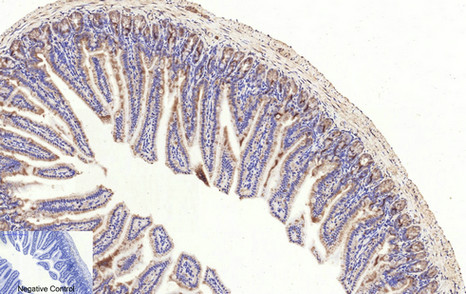

| WB | 咨询技术 | Human,Mouse,Rat |
| IF | 咨询技术 | Human,Mouse,Rat |
| IHC | 1/50-1/100 | Human,Mouse,Rat |
| ICC | 1/50-1/200 | Human,Mouse,Rat |
| FCM | 咨询技术 | Human,Mouse,Rat |
| Elisa | 1/10000 | Human,Mouse,Rat |
| Aliases | CASP3; CPP32; Caspase-3; CASP-3; Apopain; Cysteine protease CPP32; CPP-32; Protein Yama; SREBP cleavage activity 1; SCA-1 |
| Entrez GeneID | 836 |
| WB Predicted band size | Calculated MW: 32 kDa; Observed MW: 17 kDa |
| Host/Isotype | Rabbit IgG |
| Antibody Type | Primary antibody |
| Storage | Store at 4°C short term. Aliquot and store at -20°C long term. Avoid freeze/thaw cycles. |
| Species Reactivity | Human,Mouse,Rat |
| Immunogen | The antiserum was produced against synthesized peptide derived from human Caspase 3. AA range:126-175 |
| Formulation | Purified antibody in PBS with 0.05% sodium azide,0.5%BSA and 50% glycerol. |
+ +
以下是3篇涉及Cleaved-Caspase 3 p17抗体的代表性文献,内容涵盖不同研究领域中的应用:
---
1. **文献名称**:*"Caspase-3 is required for DNA fragmentation and morphological changes associated with apoptosis"*
**作者**:Porter AG, Jänicke RU
**摘要**:该研究通过Western blot和免疫组化技术,利用Cleaved-Caspase 3 p17抗体证实了Caspase-3在凋亡过程中对DNA断裂和细胞形态变化的必要性,为凋亡机制提供了关键证据。
2. **文献名称**:*"Chemotherapy-induced apoptosis in a transgenic model of neuroblastoma involves activation of Caspase-3"*
**作者**:Houghton PJ et al.
**摘要**:研究使用Cleaved-Caspase 3 p17抗体检测神经母细胞瘤小鼠模型中化疗药物诱导的凋亡,发现Caspase-3激活与肿瘤消退显著相关,支持了靶向凋亡通路的治疗策略。
3. **文献名称**:*"Role of Caspase-3 cleavage in cerebral ischemia-induced neurodegeneration"*
**作者**:Chen J et al.
**摘要**:通过免疫荧光和流式细胞术结合p17抗体,揭示了脑缺血后神经元中Caspase-3的活化与神经退行性变的直接关联,为缺血性损伤的治疗提供了分子靶点。
---
如需进一步扩展,可补充针对特定疾病模型(如癌症、神经疾病)或实验技术(如流式、免疫组化)的文献。
Cleaved-Caspase 3 p17 antibody is a widely used tool in apoptosis research, specifically targeting the activated form of Caspase-3. a key executioner protease in programmed cell death. Caspase-3 exists as an inactive zymogen (procaspase-3) that undergoes proteolytic cleavage during apoptosis, generating p17 and p12 subunits. The p17 fragment, derived from the large subunit, serves as a definitive marker of Caspase-3 activation.
This antibody specifically recognizes the cleaved p17 fragment, distinguishing it from the full-length protein. Its detection is crucial for confirming apoptotic activity in experimental models, as Caspase-3 cleavage represents an irreversible commitment to cell death. Applications include Western blotting, immunohistochemistry, and flow cytometry to assess apoptosis in cancer research, neurodegenerative studies, and developmental biology.
The antibody's significance lies in its ability to provide precise evidence of apoptotic signaling pathway activation. Researchers use it to evaluate therapeutic responses, study disease mechanisms involving dysregulated apoptosis, and validate CRISPR/cas9 or drug-induced cell death. Commercial variants are typically raised in rabbits or mice, with validation across multiple species. Proper controls are essential, as nonspecific bands may occur in some tissue lysates. Overall, it remains a cornerstone reagent for quantifying apoptosis in both in vitro and in vivo systems.
×